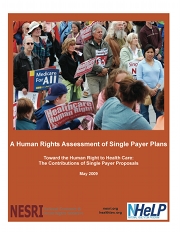New Report Casts Exclusion of Single-Payer Option as Question of Human Rights

At a critical moment for health care reform in the United States, the National Economic and Social Rights Initiative (NESRI) has published an in-depth assessment of single payer proposals, finding that single payer plans go further towards meeting key human rights standards than market-based plans.
The question of whether national leaders will consider a single payer system as an option for health care reform has become a question of basic democracy. Despite most Americans supporting a single payer solution, the Obama Administration and congressional leaders have denied it consideration. Key stakeholders such as health care professionals, patients and single payer advocates have been excluded from hearings regarding health reform, prompting courageous civil disobedience actions by health care advocates. One of the protesters at the recent Senate Finance Committee hearings, Dr. Margaret Flowers of PNHP Maryland, said: “We have entered a new phase in the movement for health care as a human right: acts of civil disobedience. It is time to directly challenge corporate interests. History has shown that in order to gain human rights, we must be willing to speak out and risk arrest.”
Donna Smith of the California Nurses Association, in a recent article, fears that any health care reform bill that comes out of Washington will be falsely advertised as a “human rights victory”. But what would a true human rights victory look like? NESRI’s report addresses that question. The report analyzes four bills (Conyers HR676, Sanders S703/McDermott HR1200, Vermont S99/H100 and Minnesota SF118/HF135) against key human rights principles such as universality, equity and accountability. It shows that if health care reformers are serious about achieving a system that respects human rights, single payer proposals must be given consideration as they would vastly increase access to equal high-quality care and secure long-term financial sustainability.
NESRI’s report is intended to support the efforts of human right to health care advocates by providing a serious analysis of the benefits of a single payer plan. Cathy Albisa, co-founder of NESRI, said: “We have a fundamental choice to make as a country; we can either be guided by human rights that reflect our founding values or we can continue down the path of special corporate interests. The kind of health care system our government puts in place and what weight is given to the opinion of the American people in the upcoming debate is an important barometer of the health of our democracy and our ability to move towards a more equitable society.”
